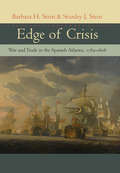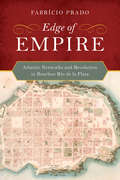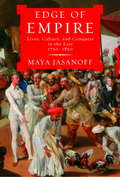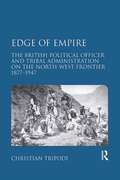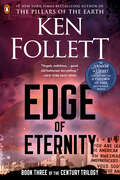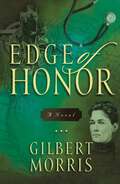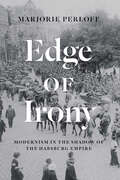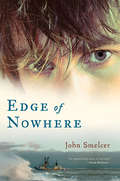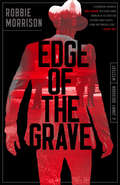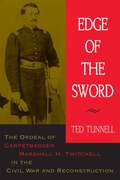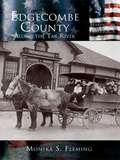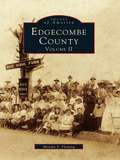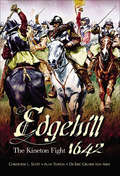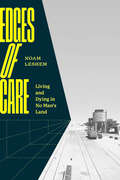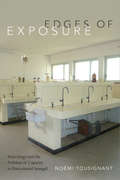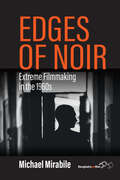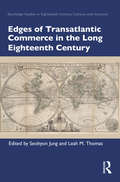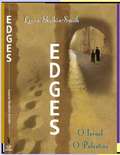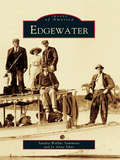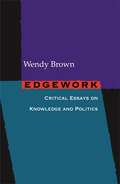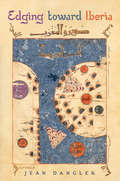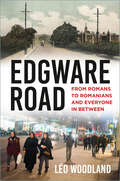- Table View
- List View
Edge of Crisis: War and Trade in the Spanish Atlantic, 1789–1808
by Stanley J. Stein Barbara H. SteinThis authoritative study of colonialism in the Spanish empire at the end of the eighteenth century examines how the Spanish metropole attempted to preserve the links to its richest colony in the western Atlantic, New Spain (Mexico), in the face of international developments. Continuing the approach in Silver, Trade, and War and Apogee of Empire, Barbara and Stanley Stein detail Spain’s ad hoc efforts to adjust metropolitan and colonial institutions, structures, and ideology to the pressures of increased competition in the Old and New worlds.In reviewing the attempts at reform, the authors explore networks of individuals and groups, some accepting and others rejecting the Spanish transatlantic trade system. They provide accounts from both sides of the Atlantic to show how economic policy, imperial goals, and consequent social divisions and factionalism in New Spain and Spain undermined the government’s efforts at economic and political adjustments. The Steins draw on a wide range of archival material in Mexico, Spain, and France to place the waning of the Spanish empire in an Atlantic perspective. They also show how Spain came to the verge of collapse in a time of revolution and at the beginning of the transition from commercial to industrial capitalism.Comprehensive and carefully researched, Edge of Crisis explains the broad array of factors that led up to the French invasion of Spain in early 1808.
Edge of Empire
by Dr Fabrício PradoIn the first decades of the 1800s, after almost three centuries of Iberian rule, former Spanish territories fragmented into more than a dozen new polities. Edge of Empire analyzes the emergence of Montevideo as a hot spot of Atlantic trade and regional center of power, often opposing Buenos Aires. By focusing on commercial and social networks in the Rio de la Plata region, the book examines how Montevideo merchant elites used transimperial connections to expand their influence and how their trade offered crucial support to Montevideo's autonomist projects. These transimperial networks offered different political, social, and economic options to local societies and shaped the politics that emerged in the region, including the formation of Uruguay. Connecting South America to the broader Atlantic World, this book provides an excellent case study for examining the significance of cross-border interactions in shaping independence processes and political identities.
Edge of Empire
by Maya JasanoffIn this imaginative book, Maya Jasanoff uncovers the extraordinary stories of collectors who lived on the frontiers of the British Empire in India and Egypt, tracing their exploits to tell an intimate history of imperialism. Jasanoff delves beneath the grand narratives of power, exploitation, and resistance to look at the British Empire through the eyes of the people caught up in it. Written and researched on four continents, Edge of Empire enters a world where people lived, loved, mingled, and identified with one another in ways richer and more complex than previous accounts have led us to believe were possible. And as this book demonstrates, traces of that world remain tangible--and topical--today. An innovative, persuasive, and provocative work of history. From the Trade Paperback edition.
Edge of Empire: The British Political Officer and Tribal Administration on the North-West Frontier 1877–1947
by Christian TripodiBritain's often rather ad hoc approach to colonial expansion in the nineteenth century resulted in a variety of imaginative solutions designed to exert control over an increasingly diverse number of territories. One such instrument of government was the political officer. Created initially by the East India Company to manage relations with the princely rulers of the Indian States, political offers developed into a mechanism by which the government could manage its remoter territories through relations with local power brokers; the policy of 'indirect rule'. By the beginning of the twentieth century, political officers were providing a low-key, affordable method of exercising British control over 'native' populations throughout the empire, from India to Africa, Asia to Middle East. In this study, the role of the political officer on the Western Frontier of India between 1877-1947 is examined in detail, providing an account of the personalities and mechanisms of colonial influence/tribal control in what remains one of the most unstable regions in the world today. It charts the successes, failures, dangers and attractions of a system of power by proxy and examines how, working alone in one of the most dangerous and lawless corners of the Empire, political officers strove to implement the Crown's policies across the North-West Frontier and Baluchistan through a mixture of conflict and collaboration with indigenous tribal society. In charting their progress, the book provides a degree of historical context for those engaging in ambitious military operations in the same region, seeking to increasingly rely on the support of tribal chiefs, warlords and former enemies in order for new administrations to function. As such this book provides not only a fascinating account of key historical events in Anglo-Indian colonial history, but also provides a telling insight and background into an increasingly seductive aspect of contemporary political and military strategy.
Edge of Eternity: Book Three of The Century Trilogy (The Century Trilogy #3)
by Ken FollettKen Follett's extraordinary, #1 New York Times bestselling historical epic, the Century Trilogy, reaches its sweeping, passionate conclusion.In Fall of Giants and Winter of the World, Ken Follett followed the fortunes of five international families--American, German, Russian, English, and Welsh--as they made their way through the twentieth century. Now they come to one of the most tumultuous eras of all: the 1960s through the 1980s, from civil rights, assassinations, mass political movements, and Vietnam to the Berlin Wall, the Cuban Missile Crisis, presidential impeachment, revolution--and rock and roll.East German teacher Rebecca Hoffmann discovers she's been spied on by the Stasi for years and commits an impulsive act that will affect her family for the rest of their lives . . . . George Jakes, the child of a mixed-race couple, bypasses a corporate law career to join Robert F. Kennedy's Justice Department and finds himself in the middle of not only the seminal events of the civil rights battle but a much more personal battle of his own . . . . Cameron Dewar, the grandson of a senator, jumps at the chance to do some official and unofficial espionage for a cause he believes in, only to discover that the world is a much more dangerous place than he'd imagined . . . . Dimka Dvorkin, a young aide to Nikita Krushchev, becomes an agent both for good and for ill as the United States and the Soviet Union race to the brink of nuclear war, while his twin sister, Tanya, carves out a role that will take her from Moscow to Cuba to Prague to Warsaw--and into history.
Edge of Honor
by Gilbert MorrisQuentin Larribee is a surgeon--one of the best. But in the confusion of one of the Civil War's last, desperate skirmishes, the hands devoted to healing bring death to William Breckenridge, an enemy soldier in the act of surrendering. Now the deed haunts Quentin. A bright future lies before him, with marriage to the lovely Irene Chambers and eventual ownership of her father's prosperous medical practice. But it cannot ease Quentin's troubled conscience. Honor compels him to see to the welfare of the dead man's family. Quentin moves from New York City to the little town of Helena, Arkansas, where he attempts to save the wife of Breckenridge and her children from financial ruin. But in trying to solve one problem, he creates another, falling in love with the widow of the man he killed--a woman who knows nothing of his terrible secret. Two women beckon Quentin--one to a life where his gift as a healer can prosper beyond his wildest dreams, the other to a truer but impossible love. Edge of Honor is an unforgettable novel of redemption and honor, where good is found in the unlikeliest places and God's unseen hand weaves a masterful tapestry of human hearts and lives.
Edge of Irony: Modernism in the Shadow of the Habsburg Empire
by Marjorie PerloffAmong the brilliant writers and thinkers who emerged from the multicultural and multilingual world of the Austro-Hungarian Empire were Joseph Roth, Robert Musil, and Ludwig Wittgenstein. For them, the trauma of World War I included the sudden loss of the geographical entity into which they had been born: in 1918, the empire was dissolved overnight, leaving Austria a small, fragile republic that would last only twenty years before being annexed by Hitler's Third Reich. In this major reconsideration of European modernism, Marjorie Perloff identifies and explores the aesthetic world that emerged from the rubble of Vienna and other former Habsburg territories--an "Austro-Modernism" that produced a major body of drama, fiction, poetry, and autobiography. Perloff explores works ranging from Karl Kraus's drama The Last Days of Mankind and Elias Canetti's memoir The Tongue Set Free to Ludwig Wittgenstein's notebooks and Paul Celan's lyric poetry. Throughout, she shows that Austro-Modernist literature is characterized less by the formal and technical inventions of a modernism familiar to us in the work of Joyce and Pound, Dada and Futurism, than by a radical irony beneath a seemingly conventional surface, an acute sense of exile, and a sensibility more erotic and quixotic than that of its German contemporaries. Skeptical and disillusioned, Austro-Modernism prefers to ask questions rather than formulate answers.
Edge of Nowhere
by John Smelcer"More psychological depth than Robinson Crusoe."-Frank McCourtPraise for Lone Wolves:"A beautiful and moving story of courage and love."-Ray Bradbury"Powerful, eloquent, and fascinating, showcasing a vanishing way of life in rich detail."-Kirkus Reviews"An adept focus on coming-of-age and an illuminating glimpse of Native Alaskan cultures."--The Horn Book"A gifted storyteller with a unique perspective. . . . A breathlessly paced and thrilling ride for readers of all ages."--Cambridge Book ReviewPraise for The Great Death and Alaskan:"Gripping and poignant. . . . Smelcer's prose is clean and rich; original yet unpretentious."-Horn Book, starred review"John Smelcer is Alaska's modern-day Jack London."-W.P. Kinsella"An indispensible contribution to Alaskan literature."-J. D. Salinger"Smelcer speaks from the land, for the land, and the people who belong to it."-Ursula K. Le GuinSixteen-year-old Seth and his dog fall off his father's commercial fishing boat in Prince William Sound. They struggle to survive off land and sea as they work their way home from island to island in a three-month journey. The isolation allows Seth to understand his father's love, accept his Native Alaskan heritage, and accept his grief over his mother's death.John Smelcer is poetry editor of Rosebud and the author of more than forty books. He is an Alaskan native of the Ahtna tribe, and the last tribal member who reads and writes in Ahtna. He divides his time between Talkeetna, Alaska, and Kirksville, Missouri, where he teaches in the department of communications studies at Truman State University.
Edge of the Grave: A Jimmy Dreghorn Mystery
by Robbie MorrisonTwo detectives hunt a killer amidst the lawless streets and high society of 1930&’s Glasgow in this &“brawling series debut&” (The New York Times Book Review) that &“serves up a delicious slice of gangster noir&” (Adrian McKinty)—inspired by the true story of the Scottish Untouchables.&“A Glaswegian version of Peaky Blinders, with razor gangs brawling in the street and festering family secrets . . . a dark and powerful story.&”―Sunday TimesGlasgow, 1932. When the son-in-law of one of the city&’s wealthiest shipbuilders is found floating in the River Clyde with his throat cut, it falls to Inspector Jimmy Dreghorn to lead the murder case–despite sharing a troubled history with the victim&’s widow.From the flying fists and flashing blades of Glasgow&’s gangland underworld to the backstabbing upper echelons of government and big business, Dreghorn and his partner, &“Bonnie&” Archie McDaid, will have to dig deep into Glasgow society to find out who wanted the man dead and why.All the while, a sadistic murderer stalks the post-war city, leaving a trail of dead bodies in their wake. As the case deepens, Dreghorn realizes that the answers may lie in his old ties with the victim&’s family—and the horrors he saw in the Great War.Edge of the Grave is historical noir at its very best—a gripping mystery that truly transports the reader to the lawless streets and high society of 1930s Glasgow and brings a teeming, chaotic city irresistibly to life.
Edge of the Sword: The Ordeal of Carpetbagger Marshall H. Twitchell in the Civil War and Reconstruction
by Ted TunnellTed Tunnell's superbly researched biography of Marshall H. Twitchell is a major addition to Reconstruction literature. New England native, Union soldier, Freedmen's Bureau agent, and Louisiana planter, Twitchell became the radical political boss of Red River Parish in the 1870s. He forged an economic alliance with entrepreneurial Jewish merchants and rose to power during the first upswing of the southern economy after the war. The Panic of 1873, however, undermined his regime and virtually overnight the New Englander quickly went from financial benefactor to scapegoat for northwest Louisiana's failed dreams of prosperity. His life-and-death struggle with the notorious White League has more gut-wrenching suspense than most novels. The first full-length study of Twitchell, Edge of the Sword is edifying, entertaining, and cutting-edge scholarship.
Edgecombe County: Along the Tar River
by Monika S. FlemingEdgecombe County, in the coastal plains of North Carolina along the Tar River, was once home to the Tuscarora tribes and was founded by English immigrants from Virginia. The county swelled as an agricultural center in the cotton and textile industries, bolstered by a wealth of lumber and sustained by a thriving inland river port and railroad. Though the residents struggled through natural, industrial, and economic upheaval, their courage and fortitude endured these hardships and unified their community.
Edgecombe County: Volume II (Images of America)
by Monika S. FlemingEdgecombe County is a unique combination of beautiful pastoral scenery and strong, interestingpeople. Communities like Pinetops, Whitakers, Speed, Leggett, and Conetoe provide an excellent insight into the struggles and triumphs of traditionalAmerican small towns. In this highly anticipatedsecond volume, you will explore the social identity of Edgecombe County by taking visual tours of severalhistoric neighborhoods, schools, and churches. As with any successful region, Edgecombe County's greatest resource is its people, for the area has provided a wealth of talented citizens to the political arena, military battlefronts, the playing fields of professional sports, and the artistic community. This collection of images also honors the countless men and women who persevered through the county's periods of war, depression, and natural disaster and continued to support one another in times of need and adversity.
Edgehill 1642: The Battle Reinterpreted
by Christopher L. Scott Alan Turton Dr. Eric Gruber von ArniThis seminal new study of a key battle of the Civil Wars re-examines one of England's most mysterious battlefields at Edgehill, and it combines the work of three outstanding military historians. Each is an expert in the areas of battlefield interpretation, military equipment and organization, and battle casualties and care. Their unique blend of knowledge gives a fascinating insight into one of the most famous and often misunderstood engagements of the conflict. It also introduces an exciting and innovative approach to understanding the battle and the battlefield.
Edges of Care: Living and Dying in No Man’s Land
by Noam LeshemA firsthand look at the lives of those who reside in no man’s land—the violence they endure and their immense resilience. “No man’s land” invokes stretches of barren landscape, twisted barbed wire, desolation, and the devastation of war. But this is not always the reality. According to Noam Leshem in Edges of Care, the term also reveals radical abandonment by the state. From the Northern Sahara to the Amazon rainforests, people around the world find themselves in places that have been stripped of sovereign care. Leshem is committed to defining these spaces and providing a more intimate understanding of this urgent political reality. Based on nearly a decade of research in some of the world’s most challenging conflict zones, Edges of Care offers a profound account of abandoned lives and lands, and how they endure and sometimes thrive once left to fend for themselves. Leshem interrogates no man’s land as a site of radical uncaring: abandoned by a sovereign power in a relinquishment of responsibility for the space or anyone inside it. To understand the ramifications of such uncaring, Leshem takes readers through a diverse series of abandoned places, including areas in Palestine, Syria, Colombia, Sudan, and Cyprus. He shows that no man’s land is not empty of life, but almost always inhabited and, in fact, often generative of new modes of being. Beautifully written and evocative, Edges of Care reveals the unexamined complexities and political dynamics hidden within and around places governed by callous indifference.
Edges of Exposure: Toxicology and the Problem of Capacity in Postcolonial Senegal (Experimental Futures)
by Noémi TousignantIn the industrialized nations of the global North, well-funded agencies like the CDC attend to citizens' health, monitoring and treating for toxic poisons like lead. How do the under-resourced nations of the global South meet such challenges? <P><P> In Edges of Exposure, Noémi Tousignant traces the work of toxicologists in Senegal as they have sought to warn of and remediate the presence of heavy metals and other poisons in their communities. Situating recent toxic scandals within histories of science and regulation in postcolonial Africa, Tousignant shows how decolonization and structural adjustment have impacted toxicity and toxicology research. <P>Ultimately, as Tousignant reveals, scientists' capacity to conduct research—as determined by material working conditions, levels of public investment, and their creative but not always successful efforts to make visible the harm of toxic poisons—affects their ability to keep equipment, labs, projects, and careers going.
Edges of Noir: Extreme Filmmaking in the 1960s
by Michael MirabileEdges of Noir challenges the notion that noir film nearly vanished after 1958 until its subsequent “neo-noir” revival between 1973 and 1981. The 1960s, regardless of critical neglect, include some of the most provocative films of the post-World War II decades. Often formally disruptive and experimental, films including Shock Corridor (1963), Mirage (1965), The 3rd Voice (1960), and Point Blank (1967) evoke controversial issues of the era, deriving dynamic influences amongst exploitation cinema, sensationalistic American B movies, and the European New Wave movement. Whether the focus is on nuclear destruction, mind control, or surveillance, late noir films, above all else, vividly portray the collective fears from the time.
Edges of Transatlantic Commerce in the Long Eighteenth Century (Routledge Studies in Eighteenth-Century Cultures and Societies)
by Seohyon Jung Leah M. ThomasEdges of Transatlantic Commerce in the Long Eighteenth Century examines and challenges the boundaries of the Atlantic in the eighteenth century, with a particular focus on commerce. Commerce as a keyword encompasses a wide range of documented and undocumented encounters that invoke topics such as shared or conflicting ideas of value, affective experiences of the emerging global system, and development of national economies, as well as their opponents. By investigating what gets exchanged, created, or obscured on the peripheries of transatlantic commercial relations and geography in the eighteenth century, the chapters in this collection reimagine the edge as a liminal space with a potential for an alternative historical and aesthetic knowledge. To ground this inquiry in a more material dimension, the chapters engage specifically with what is being exchanged, sold, or communicated across the Atlantic by exploring ideas that are being shaped, concealed, undermined, or exploited through intricate exchanges. With its contributions from multiple contexts and disciplinary perspectives, Edges of Transatlantic Commerce offers insights into relatively neglected aspects of the transatlantic world to cultivate the value that the edges allow us to conceive.
Edges of the State (Forerunners: Ideas First)
by John ProteviUsing philosophical and scientific work to engage the perennial question of human nature This book takes a look at the formation, and edges, of states: their breakdowns and attempts to repair them, and their encounters with non-state peoples. It draws upon anthropology, political philosophy, neuroscience, evolutionary biology, child developmental psychology, and other fields to look at states as projects of constructing &“bodies politic,&” where the civic and the somatic intersect. John Protevi asserts that humans are predisposed to &“prosociality,&” or being emotionally invested in social partners and patterns. With readings from Jean-Jacques Rousseau and James C. Scott; a critique of the assumption of widespread pre-state warfare as a selection pressure for the evolution of human prosociality and altruism; and an examination of the different &“economies of violence&” of state and non-state societies, Edges of the State sketches a notion of prosocial human nature and its attendant normative maxims. Forerunners: Ideas First Short books of thought-in-process scholarship, where intense analysis, questioning, and speculation take the lead
Edges: O Israel, O Palestine
by Leora Skolkin-Smith"Edges" takes the reader to an Israel in 1963, before high walls formed a border, when, instead, metal wires hung "like hosiery lines" across the land. Liana Barish is fourteen years old when the suicide of her American father forces her mother, mourning, in despair back to her family--to Jerusalem where she grew up. For Liana it is the place where the powerful interdependence of mother and daughter--physical and spiritual--ends. It is the place of her sexual awakening.
Edgewater (Images of America)
by Sandra Wallus Sammons Jo Anne Sikes"Do you want a beautiful winter home in Florida? Located on the highest, driest, healthiest, and most beautiful spot for a town . . ." This land company advertisement is like many we see today in Florida, but it was written over 100 years ago by the founder of Hawks Park, Dr. John Milton Hawks. Hawks Park was established in 1871, and within 15 years, it had 115 permanent residents and was a popular place for many Northerners to enjoy the warm winters along the edge of the beautiful Indian River. By 1925, the growing community became a town and adopted the more descriptive name of Edgewater. While there are more than 20,000 residents in 2005, the population of the city still swells during the winter when people follow the migrating birds and boats, seeking refuge from the snow. Although much has changed since the founding of Edgewater, rare vintage photographs will take the readers through the town's years of growth in this illustrative history.
Edgework: Critical Essays on Knowledge and Politics
by Wendy BrownEdgework brings together seven of Wendy Brown's most provocative recent essays in political and cultural theory. They range from explorations of politics post-9/11 to critical reflections on the academic norms governing feminist studies and political theory. Edgework is also concerned with the intellectual and political value of critique itself. It renders contemporary the ancient jurisprudential meaning of critique as krisis, in which a tear in the fabric of justice becomes the occasion of a public sifting or thoughtfulness, the development of criteria for judgment, and the inauguration of political renewal or restoration. Each essay probes a contemporary problem--the charge of being unpatriotic for dissenting from U.S. foreign policy, the erosion of liberal democracy by neoliberal political rationality, feminism's loss of a revolutionary horizon--and seeks to grasp the intellectual impasse the problem signals as well as the political incitement it may harbor.
Edging Toward Iberia
by Jean DanglerNonmodern Iberia was a fluid space of shifting political kingdoms and culturally diverse communities. Scholars have long used a series of obsolete investigative frameworks such as the Reconquista, along with modern ideas of nation-states, periodization, and geography that are inadequate to the study of Iberia’s complex heterogeneity. In Edging Toward Iberia Jean Dangler argues that new tools and frameworks for research are needed. She proposes a combination of network theory by Manuel Castells and World-Systems Analysis as devised by Immanuel Wallerstein to show how network and system principles can be employed to conceptualize and analyze nonmodern Iberia in more comprehensive ways. Network principles are applied to the well-known themes of medieval trade and travel, along with the socioeconomic conditions of feudalism, slavery, and poverty to demonstrate how questions of power and temporal-historical change may be addressed through system tenets. Edging Toward Iberia challenges current historical and literary research methods and brings a fresh perspective on the examination of politics, identity, and culture.
Edgware Road: From Romans to Romanians and Everyone In Between
by Léo WoodlandFrom Romans at one end to Romanians at the other, journey through time to discover the legacy of Edgware Road. Meet murderers, mayhemmakers, mistresses and Great Train Robbers who made their mark on history. Encounter the shy boffin who shortened the war, the nudists who shocked the prudish and the country’s cruellest workhouse, but a few of the fascinating tales that make Edgware Road special.Take a fascinating stroll along London’s most colourful road and its surroundings, full of stories to tell and secrets to keep.
Edible French
by Clotilde Dusoulier Melina JosserandThe idiosyncrasies of language can tell us a lot about a culture. In this delightful book, Clotilde Dusoulier, creator of the award-winning food blog Chocolate & Zucchini, delves into the history and meaning of fifty of the French language's most popular food-related expressions. Accompanied by beautiful watercolor illustrations by artist Mélina Josserand, Edible French explores whimsical turns of phrase such as: Tomber dans les pommes (falling into the apples) = fainting Se faire rouler dans la farine (being rolled in flour) = being fooled Avoir un cœur d'artichaut (having the heart of an artichoke) = falling in love easily A treat of a read for Francophiles and food lovers alike, Edible French is the tastiest way to explore French culture--one that will leave you in high spirits--or, as the French say, vous donnera la pêche (give you the peach).
Edible Histories, Cultural Politics
by Marlene Epp Franca Iacovetta Valerie J. KorinekJust as the Canada's rich past resists any singular narrative, there is no such thing as a singular Canadian food tradition. This new book explores Canada's diverse food cultures and the varied relationships that Canadians have had historically with food practices in the context of community, region, nation and beyond.Based on findings from menus, cookbooks, government documents, advertisements, media sources, oral histories, memoirs, and archival collections, Edible Histories offers a veritable feast of original research on Canada's food history and its relationship to culture and politics. This exciting collection explores a wide variety of topics, including urban restaurant culture, ethnic cuisines, and the controversial history of margarine in Canada. It also covers a broad time-span, from early contact between European settlers and First Nations through the end of the twentieth century.Edible Histories intertwines information of Canada's 'foodways' - the practices and traditions associated with food and food preparation - and stories of immigration, politics, gender, economics, science, medicine and religion. Sophisticated, culturally sensitive, and accessible, Edible Histories will appeal to students, historians, and foodies alike.
